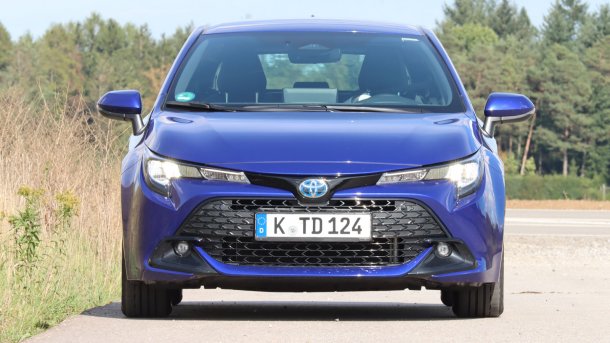EU car market: Hybrid-drive new cars' share on the rise
For the first time this year, demand for new cars in the EU was lower in March 2024 than a year earlier. Toyota and hybrids saw strong gains in some markets.

Toyota on the upswing: the brand sold 18.4 percent more cars in March than in the previous month. In the picture: Toyota Corolla (test)
(Bild: Pillau)
Around one million cars were registered for the first time in the European Union in March. This was 5.2 percent less than a year earlier, according to the industry association Acea in Brussels. For the first quarter of 2024, the car industry can therefore report growth of 4.4 percent to just under 2.8 million cars.
E-cars in the red - but only in March
Sales of electric cars fell by 11.3 percent in March. In the first three months of the year, they increased by 3.8 percent to around 333,000 vehicles. The market share of all-electric vehicles was 13 percent. A year earlier, it had been 13.9 percent. While sales of such cars in Belgium and France increased by double-digit percentages year-on-year, they slumped by almost 29 percent in Germany. Hybrid models increased their share from 24.4 to 29 percent. France and Italy, two of the three largest markets for cars with hybrid drives, recorded significant increases of 29.6 and 8.3 percent respectively. In Germany, there was a slight decline of 0.3 percent. This segment achieved sales of 299,426 units and thus captured a market share of 29 percent. In March 2023, the figure was 24.4 percent.
(Bild: ACEA)
The most successful groups
The Volkswagen Group, comprising VW, Skoda, Audi, Seat, Cupra, and Porsche brands, maintained its market leadership in the EU. However, new registrations for Volkswagen fell by nine percent in March to just over 251,000 vehicles, following a ten percent increase in February.
(Bild: ACEA)
Stellantis, featuring brands like Fiat, Peugeot, Citroën, and Opel, saw a 12.6 percent decrease as the second-largest automaker. The decline for Renault, the third-largest supplier, was smaller at 2.1 percent, while Toyota, ranking fourth, boosted its new registrations by 18.4 percent.
(mfz)